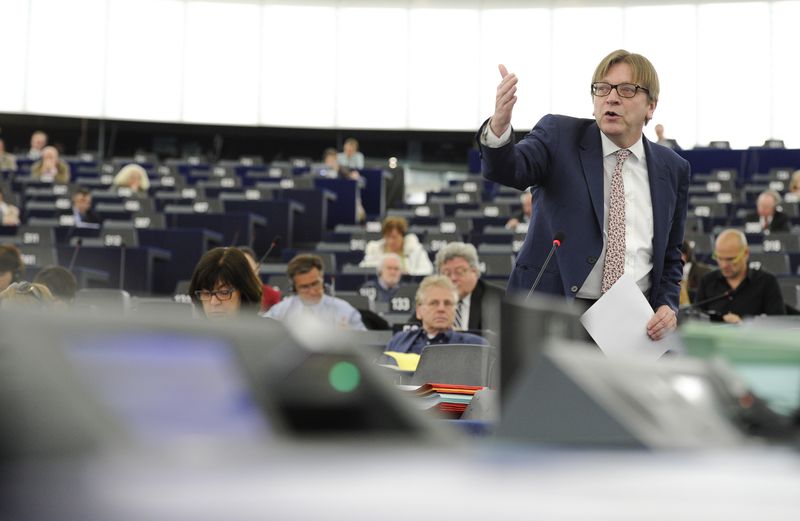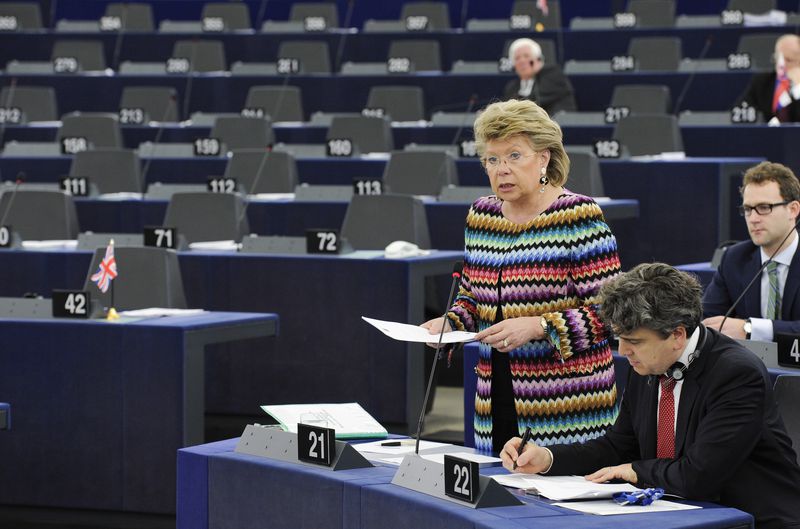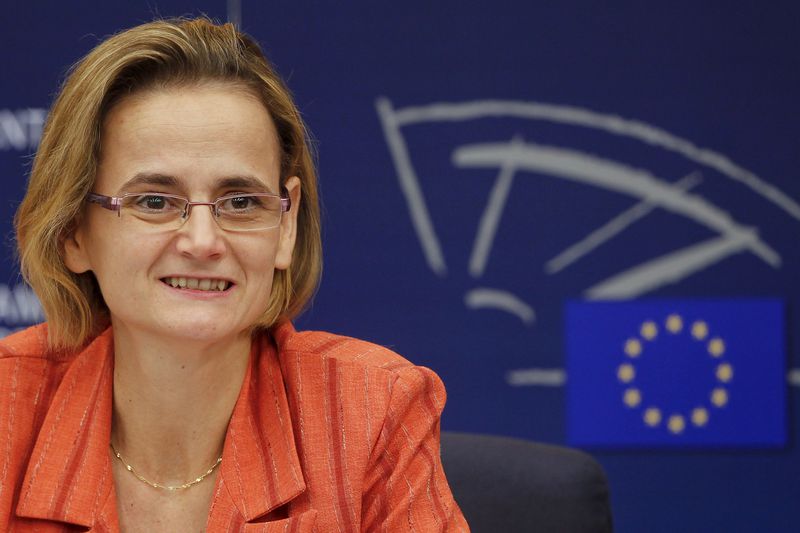Should EU Drop Its 'Atom Bomb' on Hungary?
Adelina Marini, April 23, 2013
 "Hungary is trampling over our common values and denying them to its citizens". "That's why there is a clear case to trigger Article 7.1 of the Treaty, because in Hungary there is a clear risk of a serious breach of the fundamental European values set out in Article 2". This is what Guy Verhofstadt, leader of the Liberal group in the European Parliament, said in Strasbourg during the April plenary session, when there was a debate on the situation with the fundamental rights and freedoms in Hungary, upon the initiative of ALDE and provoked by the numerous amendments to the Constitution by the majority of Viktor Orban (Fidesz).
"Hungary is trampling over our common values and denying them to its citizens". "That's why there is a clear case to trigger Article 7.1 of the Treaty, because in Hungary there is a clear risk of a serious breach of the fundamental European values set out in Article 2". This is what Guy Verhofstadt, leader of the Liberal group in the European Parliament, said in Strasbourg during the April plenary session, when there was a debate on the situation with the fundamental rights and freedoms in Hungary, upon the initiative of ALDE and provoked by the numerous amendments to the Constitution by the majority of Viktor Orban (Fidesz).
What do articles 7.1 and 2 of the Treaty of the EU say?
The values articulated in Article 2 of TEU are the following: respect for human dignity, freedom, democracy, equality, the rule of law and respect for human rights, including the rights of persons belonging to minorities. In this article, it is specified that these values are common for the member states in "a society in which pluralism, non-discrimination, tolerance, justice, solidarity and equality between women and men prevail".
And point 1 of Article 7 of TEU provides for to be defined that there is a clear risk of a serious breach of the values by a member state. This can be done by one third of the member states, the Europarliament or the European Commission. The Council can also take such a decision on the basis of a majority of four fifths and after gaining the consent of the European Parliament. This article was described during the debate in Strasbourg as an "atom bomb" because one of the points in it foresees a member state that breaches the EU fundamental values to be temporarily deprived of some rights in the Council.
According to Commission Vice President Viviane Reding, who is responsible for justice and fundamental rights, this article indeed is an atom bomb which is better to have, but not having to use it. She recalled briefly what actions had the Commission undertaken in its attempts to approach the developments in Hungary adequately.
What are the developments in Hungary?
In its resolution from February last year, the European Parliament, as promised, continued to follow the way in which Viktor Orban's government was using its nowadays rarely met in Europe two thirds majority. In a working document of the European Parliament, a comprehensive analysis is made of the introduced Constitutional amendments, the actions of the Constitutional court and the positions of the Venice Commission to the Council of Europe are also quoted. Rapporteur is Rui Tavares (Greens/EFA, Portugal) and co-authors of the document are Anthea McIntyre (ECR, UK) and Marie-Christine Vergiat (European United Left, France).
In the document, it is pointed out that the process that had led to the adoption of the new Constitution of Hungary is the first thing that causes concern because the draft was prepared by representatives of the ruling coalition FIDESZ/KDNP and was presented to the Hungarian Parliament for approval on March 14th 2011 on the basis of a draft legislation put forward by individual members of Parliament. The problem with this type of putting forward legislation is that it passes through an accelerated procedure. In this way, the draft has been approved with the support of the ruling majority. To compare, when the government puts forward draft legislation, a procedure of deep consultations is required with all the interested parties. A majority of amendments to the basic law of the country were put forward exactly under this circumventing procedure, without broad debates in Hungarian society.
The working paper of the European Parliament quotes the position of the Venice Commission in which it regrets that there was no transparency in the process and that there was insufficient dialogue between the majority and the opposition. There were also no possibilities for adequate public debates because of the limited time.
Another controversial point is the adoption of the transitional provisions to the Constitution, which cover areas defined by the Constitutional Court in December last year as lacking transitional character. Those are provisions concerning the powers of the chief prosecutor and the president of the National Judicial Service to point a court other than the court of common competence for the sake of solving a specific case. Among the proposed provisions is also the general retirement age for judges and prosecutors. In general, the basic laws require the support of a qualified majority of two thirds of the members of Parliament to be adopted and changed. The new Hungarian Constitution points to 26 areas regulated by cardinal laws, including the judiciary, family policy, the rights of nationalities, taxation and pension system. According to the document however, resorting to cardinal legislation is appropriate when defining fundamental principles, like a national institutional framework. The rest are policies that are managed via regular legislation, such as family legislation, social and tax policies.
In this regard, the Venice Commission points out that "Functionality of a democratic system is rooted in its permanent ability to change. The more policy issues are transferred beyond the powers of simple majority, the less significance will future elections have and the more possibilities does a two- third majority have of cementing its political preferences and the country's legal order. Elections [...] would become meaningless if the legislator would not be able to change important aspects of the legislation that should have been enacted with a simple majority".
third majority have of cementing its political preferences and the country's legal order. Elections [...] would become meaningless if the legislator would not be able to change important aspects of the legislation that should have been enacted with a simple majority".
In the working document, it is pointed out that a similar approach could prevent a future government that relies on a simple majority to change those policies regulated with cardinal laws by the current government. Restrictions are also introduced for the parliamentary powers in the area of budget issues "as the newly established non-parliamentary Budget Council appears to have in a number of cases a power of ‘veto’ over the State budget. Adoption of the budget is usually the core competence and exclusive privilege of parliament and allows for the implementation of the political program. As recalled by the Venice Commission making the decision dependent on another authority with limited democratic legitimacy may negatively impact upon the democratic legitimacy of budgetary decisions", the document reads.
The leader of the group of Socialists and Democrats in the European Parliament, Hannes Swoboda (Austria), pointed out during the debate, that in a country where there was rule of law it cannot be said in the Constitution when judges should retire and to pass legislation that is normally regulated by simple legislation in countries with rule of law. The statement of the representative of the EPP group (the biggest) was generally soft and neutral. Viktor Orban's party (Fidesz) is part of the EPP family. In this sense, the chief of the Liberals in EP, Guy Verhofstadt, expressed indignation that the debate again turned into a battle between the left and the right.
Currently, the Commission is studying the latest amendment to the Constitution, the fourth since the beginning of the revision. Commissioner Reding assured that the analysis would be objective, non-partisan and fair, with full adherence to the EU legislation and principles. "This is what we have done in all other situations such as in Romania last year", Ms Reding added. She made a brief analysis of the proposed changes with the fourth amendment, one of which is introducing in the cardinal legislation a payment obligation for cases in the European Court of Justice. The application of these provisions means that Hungary will introduce practically a tax on Hungarian citizens if the country is fined for violation of EU legislation. "Is it really sensible to make citizens pay for a tax whenever the state would fail to be in compliance with EU law?", Ms Viviane Reding asked and added that practically the citizens would be punished twice: once when their rights are breached and second, when they are made to pay for that.
"This could undermine the authority of the Court of Justice", warned the European Commission vice president. The Commission is also concerned with the restrictions the fourth amendment introduces regarding political advertisement. With the proposed change, restrictions are introduced on political advertisement during election campaigns, including for European Parliament, as such advertisement is allowed only on public media. "It should be noted that the audience share of private media where the restriction would apply represents almost 80% in Hungary", Viviane Reding pointed out. She said that on April 15th the Hungarian authorities presented a change to these rules which will be studied in detail.
In conclusion, the EU commissioner underscored that this was not the first time the Commission had to interfere in Hungary. Last year, two infringement procedures were opened against the country. The first, because of the forced early retirement of judges, prosecutors and notaries and, second, for the breach of the independence of the Data Protection Authority.
 The debate in the Europarliament last week was really passionate. Yet in the very beginning, a member violated the introduced limit on blue cards during debates, which President Martin Schulz supported, but with the words "OK, ask you stupid question". Later, with a high emotional charge, Hungarian MEP Krisztina Morvai (non-attached) raised the issue about the legitimacy of the whole process. She directly attacked Commissioner Reding asking how could she assess legal and technical issues since she did not have the proper education. Viviane Reding is a veteran commissioner from Luxembourg. She is a third term commissioner, as before she was responsible for "education, culture, youth, media and sports" and also for "information society and media". She was a journalist with one of the big Luxembourg newspapers Luxemburger Wort and was a president of the union of journalists in Luxembourg, She has a doctorate in humanitarian sciences from the Sorbonne.
The debate in the Europarliament last week was really passionate. Yet in the very beginning, a member violated the introduced limit on blue cards during debates, which President Martin Schulz supported, but with the words "OK, ask you stupid question". Later, with a high emotional charge, Hungarian MEP Krisztina Morvai (non-attached) raised the issue about the legitimacy of the whole process. She directly attacked Commissioner Reding asking how could she assess legal and technical issues since she did not have the proper education. Viviane Reding is a veteran commissioner from Luxembourg. She is a third term commissioner, as before she was responsible for "education, culture, youth, media and sports" and also for "information society and media". She was a journalist with one of the big Luxembourg newspapers Luxemburger Wort and was a president of the union of journalists in Luxembourg, She has a doctorate in humanitarian sciences from the Sorbonne.
Krisztina Morvai is a Hungarian lawyer, elected in the European Parliament from the list of the radical nationalistic party Jobbik. Although she is not a member of the party, she is nominated for a future presidential candidate of Jobbik. Ms Morvai is famous with her anti-semitic statements. During the debate last Wednesday, she was dressed in a blouse with Hungarian national decoration and on the bank in front of her there was the Hungarian flag.
Right after the debate in Strasbourg, with which the plenary on April 17th started in the morning, Eniko Gyori, the state minister for European affairs in the Hungarian government, wrote a sharp comment in EurActiv in which she accused the critics of the amendments to the Hungarian Constitution of not having read them. According to her, the critics have touched the bottom (Guy Verhofstadt in particular) when they complained that the powers of the Constitutional court were radically cut, while in fact they were expanded. If before the Court did not have the powers to review Constitutional amendments at all, now it gets the possibility to reject them for procedural flaws. In most member states, the Constitutional court has less powers, she writes, if any.
Ms Gyori, who was the face of Hungary during the first rotating presidency of the country in 2011, ends her comment pointing out that most opinion-makers prefer to talk rather than read. "Of course, it would be unfair to accuse Verhofstadt of general ignorance. He is a man of fine literary tastes, an avid reader of the late Hungarian writer Sándor Márai. But it would be time for him and his camp to catch up on the Hungarian Constitution and the related legislative texts. It is a less entertaining reading than Márai, I’m afraid. But it may prove useful for him when he gets the papers next time and decides to pronounce himself on Hungary".
Hungary is in the mouth of th European public domain since the very beginning of Viktor Orban's term, but the developments in the country are perceived in a controversial way. This can clearly be seen in the division in the European press. For instance, Hungarian daily Népszava is quoted by Eurotopics to write that Hungary has nothing to fear of the European Parliament because it is up tot he Commission to act. "As expected, yesterday's debate in the European Parliament came to nothing. Political interests have maintained the upper hand against rational arguments and common sense. [...] Once again it becomes clear that the European Parliament is unable to deal with problems like this. Now the European Commission must act. However its report on the changes to the Hungarian constitution is only expected to appear in several months' time. In Brussels too, the wheels of change turn slowly", the newspaper concludes on April 18th.
And the Polish multi-circulated daily Rzeczpospolita said that the criticism against Hungary are hypocritical because the very Community lack democratic legitimacy. "Hungary was first lambasted for the introducing crisis taxes which also applied for wholesale trade centres and then for taxing bank transactions. These measures were allegedly not in line with democratic principles and the rules of the market. But then the EU itself tried to impose horrendous taxes on the citizens of a small state, namely Cyprus. And this is supposed to be compatible with European standards - and even democratic and in  line with market requirements. [...] In actual fact the Orbán government enjoys greater democratic legitimacy than the European Commission and the members of the EU Parliament all taken together", the Polish daily writes.
line with market requirements. [...] In actual fact the Orbán government enjoys greater democratic legitimacy than the European Commission and the members of the EU Parliament all taken together", the Polish daily writes.
It is really interesting how the rules are read just like the Devil reads the Gospel, especially in some countries, among which Bulgaria, too. The debate about democratic legitimacy is getting out of control and is distracting from the real problems that can not only exasperate, but spill over as well. In Hungary, it is evident that there are problems. But more attention deserves the issue how the individual countries perceive the European values as they are articulated in Article 2 of TEU. As the tradition goes, in countries where the sense of responsibility - both individual and societal - was completely deleted during the centralised and unaccountable totalitarian rule, the interpretation of these values is pretty broad. Hungary is a very telling example, although it's a pity that not sufficient attention is paid to Bulgaria, for instance, which has similar problems.
And regarding legitimacy, it is important to note that the members of the Europarliament are elected by the citizens of the member states and the commissioners are chosen by the elected also during elections governments. For sure, there is more to be done for the way decisions are taken at EU level, but it is also good to take into account the fact that the fate of all the 500 million citizens is forged also by people whose reputation and conviction in the common values is disputable. And while we continue to bury our heads in the sand and blame each other of double standards, we forget that precisely betrayal or rather the different interpretation of values was the reason for the crisis in Greece which, for its part, shook the entire euro area and catalysed the nationalistic and populist movements.
 Federica Mogherini | © Council of the EU
Federica Mogherini | © Council of the EU | © Council of the EU
| © Council of the EU Luis De Guindos | © Council of the EU
Luis De Guindos | © Council of the EU